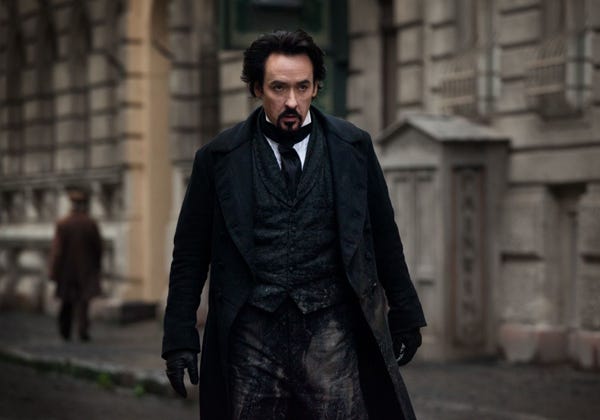The Raven

A mystery featuring writer Edgar Allan Poe as its lead, “The Raven” charts a flight path somewhere between a quaint and curious volume of forgotten lore and a 19th-century Ye Olde Grabbe Bagge version of every modern-day serial-killer thriller.
Gratuitously violent? Yes. Too samey-samey in foot chases through Baltimore’s catwalks and catacombs? Indeed. Annoyingly anachronistic butt-rock guitar wailing on the soundtrack? So much for that whole "tapping as if someone gently rapping" thing. And why exactly does Poe have a pet raccoon who likes to gnaw on a human heart?
But almost by accident amid its many idiotic attributes, “The Raven” becomes an occasionally mournful tale about the pain and fear that powered this writer's life. The upside of its schlockiness is that it underscores this idea while teetering toward pulp rather than pretentiousness — the kindest homage possible to Poe’s oeuvre itself.
With his drawn, doughy and frowny face slathered with foundation, John Cusack plays Poe. The likeness is uncanny, but the emotions seem, at the outset, headed for dyspeptic disaster. The only way to describe Cusack in the first act is that it's like watching him play Nicolas Cage playing Poe in a graveyard-hour skit on “Saturday Night Live.”
Thankfully, the script (by Hannah Shakespeare and Ben Livingston) eventually lets Poe speak as you expect this famously impetuous, impulsive author once might have — and Cusack evinces angst and agony amid grand delusions, fiery declarations and ruminative sadness at life’s tragedies. As one character says of Poe, his was “a spark of genius given by God and quenched in misery.”
On the whole, “The Raven” is much more literarily witty and weathered than it seems at first blush — even if it's a little more enamored of the madman stalking Baltimore’s cobblestone streets circa 1849. He's slicing, dicing and serving up gruesome tableaus of murder inspired by Poe’s morbid works. In one of them, a critic (nice touch, folks) is bisected a la “The Pit and the Pendulum.”
The case's chief investigator, Fields (Luke Evans, hoarsely trying to suppress his Welsh accent), is the first to pick up on the through-line to Poe — and immediately clears his name to enlist his help heading off the killer at the pass.
Besotted, bemused and beset by a lack of interest in his work, Poe wants only to make off into marriage with his beautiful muse, Emily (Alice Eve) — much to the chagrin of her short-tempered, high-society father (Brendan Gleeson). Although not to be confused with timeless romance, Cusack and Eve concoct a charming chemistry for which there’s often little time during this genre's requisite bloodletting.
But Poe is thrust deeper into the madman’s plot when Emily is abducted (via a “Masque of the Red Death” moment that cleverly distracts both characters and audience). Instructed by the killer to document all investigatory steps via pieces published in the local paper, Poe must race against time to save Emily and deduce the killer’s identity.
“The Raven” doesn’t exactly end in “sin, madness and horror” as portended. In fact, its final shot is eye-rollingly reminiscent of the stupid second-season denouement of “Dexter.” But damn if it isn’t a junkily effective, guessing-game whodunit.
There are so many throwaway close-ups of so many tangential, often mutton-chopped characters that, for a time, I thought maybe Poe’s bartender (“Downton Abbey’s” Brendan Coyle) was trying to raise Poe’s profile so he could roust up the scratch to settle his long-dusty tab. (That’s assuredly not a spoiler.) Plus, director James McTeigue (“V for Vendetta”) gets maximum mileage from a scene with a minimal peephole, through which we see only the killer’s watery eyeballs and arid lips.
Despite the roll-with-it nature of its jolts, “The Raven” is too wobbly to stick the landing of the culprit’s reveal. Let’s just say this seems like the last person capable of slashing a throat wide open midway through a ninja leap from a rooftop.
In a film filled with cheap CG bloodletting, it’s those final shots of Cusack’s face that haunt the most. It’s a perfect emotional and visual replication of the gaunt, angular and unassailably sad cheeks immortalized in all those Poe daguerreotypes — the ones that assure you Poe was a tortured soul even if you don't know the man in the image. No, “The Raven” doesn’t go deeper into his darkness peering, but at least it’s not a thriller at which you’re jeering.


